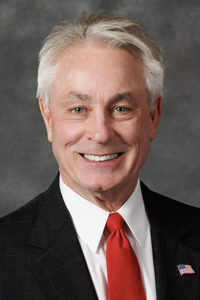Bill would allow chaplains to serve as public school counselors
The Education Committee heard testimony Feb. 27 on a proposal that would allow chaplains to perform duties typically done by public school counselors.

LB1065, introduced by Central City Sen. Loren Lippincott, would permit a chaplain to perform the duties of a school counselor without a certificate to teach, administer or perform other special services. Chaplains would, however, be required to undergo a criminal history record check and would be subject to the same eligibility restrictions as school counselors based on the results.
Under the bill, before a school district could hire a chaplain as a school counselor, the school board would be required to create a policy outlining the hiring process, disciplinary actions, continuing education requirements and termination procedures.
A similar law was passed in Texas last year, Lippincott said, and state legislatures in Florida, Indiana and Oklahoma currently are considering similar legislation. Chaplains commonly provide services in public settings, he said, such as Congress, hospitals and the military.
“If chaplains are entrusted with our firefighters and law enforcement, I think they can be of use in our schools,” Lippincott said.
Sherry Jones, a former school counselor from Grand Island, testified in support of the proposal. She said Texas has seen a decrease in teacher turnover, bullying and suicide since enacting its law permitting chaplains to perform counselor duties. Nebraska has a shortage of teachers, counselors and social workers, Jones said, and chaplains could help alleviate those shortages.
“If we indeed have a mental health crisis in our schools — coupled with the shortage of school counselors and social workers to address the needs [of students] — then we must think outside of the box as to how to provide services to our students and staff,” she said.
Also testifying in support of the bill was Ted Lewiston of Bellevue. Young people are experiencing an “epidemic” of loneliness and isolation, he said, resulting in increased rates of depression, anti-social behavior and violence in schools.
Allowing chaplains to perform the duties of school counselors would provide students and school staff with “a listening ear, a caring heart and a resource that’s outside of the normal school hierarchy,” he said.
Deb Rasmussen, a school counselor in Lincoln, testified in opposition to the proposal on behalf of the Nebraska State Education Association. She said school counselors are tasked with providing an inclusive, nonjudgmental environment for all students. Many schools have a culturally and religiously diverse student population, Rasmussen said, and a chaplain could not appropriately serve students of every faith background.
“Religion belongs outside classrooms and public schools,” she said.
Testifying in opposition to the proposal on behalf of the Nebraska School Counselor Association, Doug Hauserman said school counselors have knowledge and specialized training in mental health, education and social development. Counselors also abide by a code of ethics, he said, and are versed in local, state and federal laws and policies.
“Bottom line, chaplains who do not possess the academic and professional credentials of a school counselor — even with the best intentions — may provide inappropriate responses or interventions to students that could jeopardize students’ development and well-being,” Hauserman said.
Grant Friedman, representing ACLU Nebraska, also spoke against the proposal. Allowing chaplains to assume responsibilities in public schools could create an environment “ripe for religious coercion and indoctrination,” he said.
“Freedom of religion means that parents in faith communities — not government officials — have the right to direct their children’s religious education and development,” Friedman said.
The committee took no immediate action on LB1065.

